Hello everyone. Happy Monday.
It is very nice to be back in Portland after being gone three out of the four weeks in August. Spending that time with family was very important to me and I appreciate your patience and understanding. Not let’s get back into the rhythm of BikePortland with our weekly roundup of the best news stories and other items we came across in the past seven days…
This weeks’ roundup is brought to you by The e-Bike Store, where you can find a great deal on a quality bike at their end of summer sale.
Now let’s get into it…
Distracted cycling: I became much less interested in this story about the rise of distracted cycling when I realized the source of the new report is a car-related research firm. But still. (Forbes)
Too expensive: Highway expansion megaprojects have always been expensive, but with factors like inflation and the rising cost of land, new research shows the costs of new roads now far exceeds the benefits. (Bloomberg)
Go ahead and roll: Now we have research to help prove what many of us have understood for years: “stops as yields” or “Idaho stops” do not lead to unsafe and risky riding behaviors. (OPB)
The death toll: A summary of 2023 fatalities illustrates the sad truth that drivers are killing each other for purely selfish — and totally preventable — reasons. (USA Today)
E-bikes and national parks: The National Park Service says local park superintendents will continue to have authority to manage the use of e-bikes and there won’t be a federal law that regulates their use on NPS properties. (Bicycle Retailer & Industry News)
MADE show recap: Regrettably there was no BikePortland coverage of the big MADE bike show this year, so check out this recap from Portlander Josh Ross with a nod to “old Portland bike cutlure” in the lede. (Velo)
Portland’s parking reformer gets his due: Congrats to Portland’s very own Tony Jordan of the Parking Reform Network for being named to the Grist 50. (Grist)
Global audience for “killer cars”: One of the most widely read and respect news outlets in the world has made America’s large car problem its cover story, bringing much-needed attention to this dysfunctional part of our traffic culture. (The Economist)
Cheap gas: In part because we (the USA) are pumping a lot more of our own oil these days, gas prices are falling. That’s bad news for VMT numbers, but good news for drivers and Democrats. (CNN)
Bike bus how-to: Wirecutter, a venerable testing and review site, offers a step-by-step guide to starting a bike bus. (NY Times)
Cycling fuel: Ever wondered how riders eat at the Tour de France, the Vuelta, or other major race? Get the inside scoop from the “performance chef” of a World Tour team. (Cycling Weekly)
Thanks to everyone who sent in links this week. The Monday Roundup is a community effort, so please feel free to send us any great stories you come across.


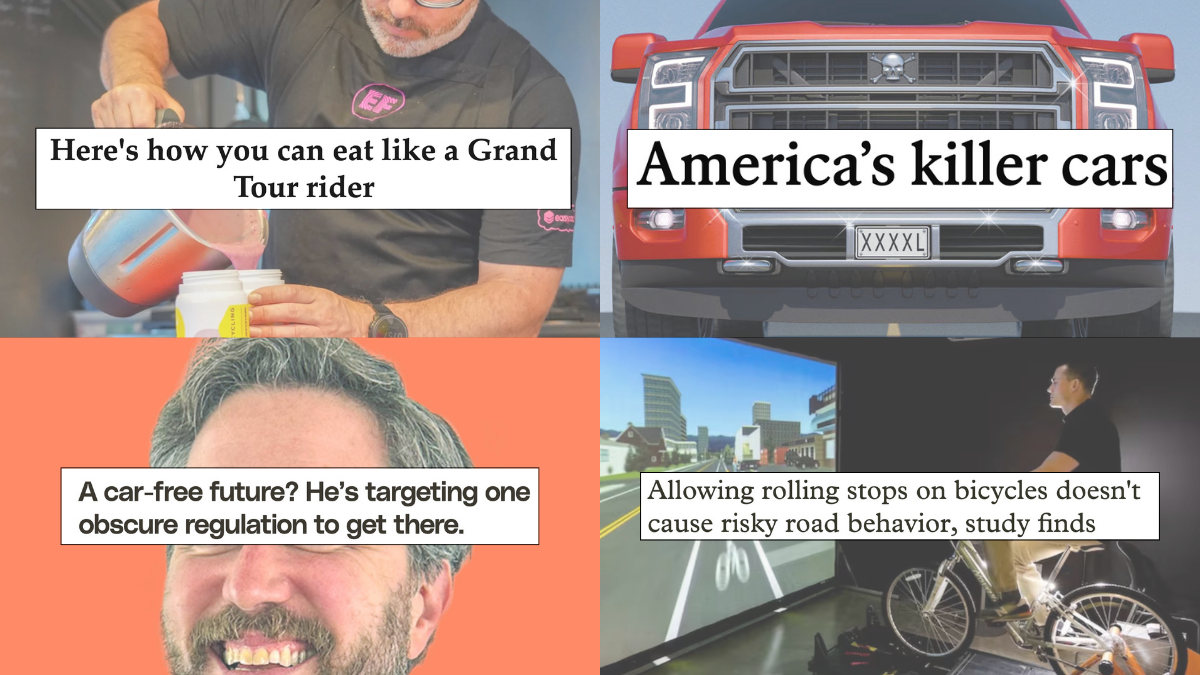
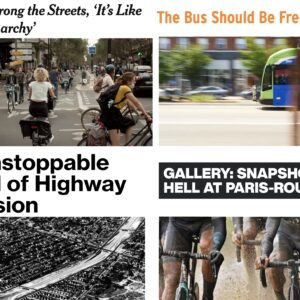
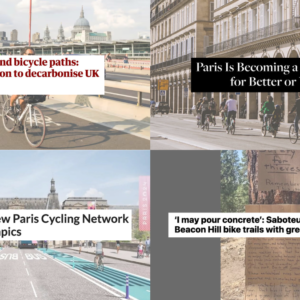
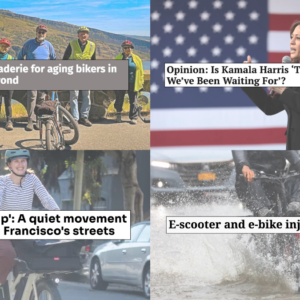
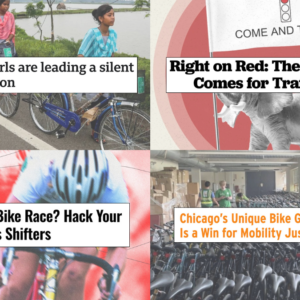
Thanks for reading.
BikePortland has served this community with independent community journalism since 2005. We rely on subscriptions from readers like you to survive. Your financial support is vital in keeping this valuable resource alive and well.
Please subscribe today to strengthen and expand our work.
In regards to the relentlessly partisan article from CNN it doesn’t seem like the author can make up his mind.
At first it seems that lower oil prices are due to outside issue such as the quote from DeHaan…
and then towards the end of the article the author states…
Does the bizarrely partisan attempt to put Trump in his place by saying Biden/Harris drilled more simply show that the more the US drills, the less gas/diesel costs at the pump?
Of course, the cheaper gas is the less incentive there is to develop alternate means of transportation. I don’t think there’s any need for citations for such an obvious reality. Cheap gas will also slow and even hamper any attempt at preparing for the vastly reduced energy capability that our transportation infrastructure will have to operate in as the ongoing climate crisis that has engulfed much of the planet affects us in the PNW.
Basically cheap gas is bad and it’s unfortunate that it seems to be the goal of the current administration to attempt to get gas as cheap as possible for partisan power.
Two quick notes: 1) Gas was $3.17 at Loves in Troutdale yesterday; that’s the cheapest I’ve seen it in (many) years. 2) The Oregonian reported that the state is considering raising gas taxes to pay for the Rose Quarter highway expansion. I want higher gas taxes, but I also know they’ll be used for things I don’t like.
Its a really good point on whether higher gas taxes are good in themselves to try to wean people off of single use autos or does what the tax money go to negate the benefit of the higher tax? After all, it doesn’t do any good to wean people off of petrol if they don’t have an alternative source of transportation that they can effectively use. If the higher taxes do go to highway expansion, then the State is simply causing financial hardship for citizens without any attempt at providing a path away from that hardship. I would be against an increased tax in that case, as i’m against congestion pricing as there is no guarantee the State will provide that realized money for alternatives to auto use. Of course, mass EV use could tip the balance of those equations, but I am not as confident as some 🙂 that that will happen.
Do you think it is possible that in 20 (or 30) years, a majority of drivers will still be using gasoline? If not, it’s just a question of when.
A simple, straightforward question that deserves a simple answer, but is likely going to get a bit of drawn out extrapolating.
I do think that in 20-30 years the majority of drivers will be using gasoline (or preferably diesel in those incredibly fuel efficient 60-70 mpg little cars for sale now in Europe). If transportation agencies were run or advised by adults I would expect that the number of ICE vehicles in those 20-30 years to be less than it is today. Being as that is not the case and I doubt the will is present anytime soon to bring about Singaporean style auto restrictions than I imagine that individual vehicle use will increase up to a point. That point being affordability and access to the cars from overseas. At some point soon a new car is going to be out of reach of a majority of people which will drive up the cost of used cars eventually putting them further out of reach as well. Factor that in with slow (fingers crossed its slow) collapse of the power grid due to climate attrition and I believe we are going to have a lot of people with out access to cars and without public infrastructure to use. Public infrastructure doesn’t effectively work for the majority of the America’s (yes, there are bright spots in places) so there are going to be some issues to work out. The main reason bikes are so important in the now and the future is they’re fun and they will survive longer that cars, whether electric or ICE.
The reason I am picking ICE over electric (thank you for hanging in this long) is that collapsing power grid. I do not believe we as a nation and definitely not as a continent will be able to maintain a power grid that will supply what is needed to keep us healthy, let alone provide for transportation. We can’t do it now (the Portland heat dome deaths, etc) and without any budgeting to bury cables or replace them I don’t believe the grid will survive the constant increase in extreme weather or the demands that climate refugees will put on it. That is not even discussing the ludicrous way we as a people have agreed to allow server farms to dominate so much of the available electricity that our aging plants can provide.
The planet has roughly 50-70 years of known oil reserves at present rate of consumption and I don’t think we’ll be able to maintain the present rate for much longer so I imagine we’ll end up leaving some for our descendants.
I agree with most of what you say, but I think you have to leave open the possibility that people’s actions may change the more s starts hitting the f. It takes “a while” to build a new nuclear power plant, for example, but that could be sped up if people pulled their heads out about nuclear and realized we need the power (assuming solar, wind, etc aren’t enough – and they might be). Maybe (big if) we can eventually do something to regulate the data center waste.
I’m just saying, although climate change disasters are going to continue ramping up in frequency and severity and we aren’t doing anything about it now, there is precedent in history for people making big changes quickly. It’s just unfortunate that we are going to wait until it’s too late to do it in a nice orderly way, we don’t plan ahead (because of the elephant in the room economic system).
I hear you on the likelihood of things speeding up once enough people internalize the “oh sh^t” aspect of what is happening and I definitely have fingers crossed that it will be enough. The nation had that moment when Sputnik went over head, when acid rain became “too much” and was finally reigned in and locally when the Klamath was freed of its concrete chains and now runs free. I also agree that nuclear power is a solid way forward and really the only way currently realistic to supply the power (if the grid can be sustained and upgraded) necessary to turn us towards a non ICE future.
It pretty funny that you take issue with what you call a partisan attempt to make your cult leader look bad and then criticize the current administration for wanting low gas prices when your Cult leaders campaign motto is DRILL BABY DRILL…
Would really appreciate it if you could manage to quit mis politicizing me.
If you can’t recognize the political bias in that article then I think you read a lot of articles like that. If there was ever an article from Fox on the Monday Roundup I would enjoy pointing out the bias in that as well. Mainstream media isn’t much fun to read other than to get a sense of what the people behind the curtains want us to fight over.
WOW!…talk about cheap fuel…I was driving for a family errand in the Corvallis area this weekend and saw $3.07 / gallon at a couple of stations. I thought the $3.69 / gallon I was seeing a long I-5 near Castle Rock WA was cheap. [Where once I thought that $5/ gallon was the ‘mental tipping point for less driving’, I think now its got to be $7 to $8 due to inflation…]
It’s time for Biden to re-fill the Strategic Petro Reserve…which is at its lowest point in 40+ years…
https://en.wikipedia.org/wiki/Strategic_Petroleum_Reserve_(United_States)
“Go ahead and roll”
When is OR going to allow rolling through red lights?
Does Oregon have a Dead Red Law? – OREGON BIKE LAW
I run every red light I can SAFELY run so the ultra-niche case of the BTA’s dead red lad had little to do with my post.